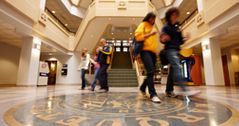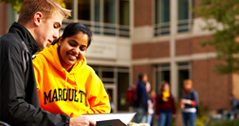Chairperson: Edward W. Korabic, Ph.D., CCC-A, FAAA
Department of Speech Pathology and Audiology website
The Department of Speech Pathology and Audiology at Marquette University offers a bachelor of science degree in speech pathology and audiology and a master of science degree in speech-language pathology. The undergraduate program is considered pre-professional, meaning that a graduate degree is necessary before a person is qualified for professional employment.
The primary purpose of the undergraduate program is to provide introductory level knowledge in the field of Speech Pathology and Audiology, within the context of a traditional liberal Arts and Sciences education, which prepares an individual for study in a professional graduate degree program. This liberal education is based on the philosophy that the individual with an educational foundation in the Arts and Sciences will have a broad appreciation for society and its values. Such a traditional undergraduate emphasis provides the needed foundation for the more narrowly focused professional education at the graduate level and is suitable for careers in other communication, education and health-related professions besides speech-language pathology and audiology.
The undergraduate major in speech pathology and audiology includes courses in the areas of normal speech production and development, disorders of speech, language and hearing and methods of evaluation and therapy. Clinical practicum involves actual work with children and adults having speech/language/hearing problems under the direct supervision of certified speech-language pathologists and audiologists. This work is accomplished at the Marquette University Speech and Hearing Clinic.
Professional preparation occurs at the graduate level and is a prerequisite for certification/ licensure as a professional speech-language pathologist or audiologist. Marquette University’s M.S. Program in Speech-Language Pathology is accredited by the Council on Academic Accreditation of the American Speech-Language-Hearing Association (CAA-ASHA) and is directed toward preparing students for the Certificate of Clinical Competence in Speech-Language Pathology (CCC-SLP). The graduate curriculum offers advanced course work and clinical practicum experiences in the nature, prevention, identification, evaluation and treatment of speech, language, hearing and related disorders in both children and adults. For students interested in licensure as a public school speech-language clinician, the curriculum meets the requirements of the Department of Public Instruction of the state of Wisconsin (WI-DPI) for licensure as a speech-language clinician.
Information Regarding Professional Certification and Licensure
Students completing professional training in Speech-Language Pathology or Audiology become eligible for certification by the American Speech-Language-Hearing Association (ASHA). This Association awards the Certificate of Clinical Competence to educationally and professionally qualified applicants. The minimum academic requirement for this certification is completion of a graduate program accredited by the Council of Academic Accreditation of the American Speech-Language-Hearing Association (CAA-ASHA). Most employers of speech-language pathologists and audiologists require this certification.
Students wishing to work as a speech-language pathologist or audiologist in the public schools must qualify for licensure from the Department of Public Instruction in the state of Wisconsin (DPI-WI), as well as meet the additional requirements of any other state in which they wish to practice. In most states, the master’s degree is the minimum requirement for licensure as a speech-language pathology or audiology clinician.
Finally, most states require speech-language pathologists and audiologists to hold a license from the state’s department of regulation and licensing. Typically, individuals having met the certification requirements for ASHA will be eligible for state licensing.
The Speech Pathology and Audiology curriculum is specifically structured to facilitate eventual fulfillment of both ASHA certification and state of Wisconsin licensure requirements. In anticipation of meeting these requirements, specific course work in speech-language pathology and audiology as well as course work in related areas such as psychology, education, social science, natural science and math are included in the Speech Pathology and Audiology curriculum.
Degree Offered
The undergraduate curriculum in Speech Pathology and Audiology is a four-year program leading to a bachelor of science degree. This program entails eight semesters of course work, and may include up to 50 clock hours of clinical practicum associated with various professional courses. Marquette University requires 128 semester credits of course work for the bachelor’s degree, and a student generally carries between 15 and 18 credits per semester. Since a B average or better is required to be considered for admission into most graduate programs, it is important that students majoring in Speech Pathology and Audiology work toward maintaining high academic achievement throughout their undergraduate program.
Accelerated Degree Program (ADP)
The Department of Speech Pathology and Audiology offers early admission into its M.S. Program in Speech-Language Pathology. Marquette undergraduate students majoring in speech pathology and audiology can apply for this program in the second semester of their junior year. Students accepted into this program are eligible to enroll in up to 12 credits of Speech Pathology and Audiology (SPPA) course work that carry graduate credit during their senior year. Credits obtained for these courses can be used to fulfill both undergraduate and graduate degree requirements. Once students inform the Graduate School of their completion of undergraduate degree requirements, their admission as a regular degree status (RDS) student in the graduate program is activated.
Bilingual English-Spanish Certificate (BIES)
The Department of Speech Pathology and Audiology offers a Bilingual English-Spanish Certificate (BIES) as part of its Master’s Degree program in Speech-Language Pathology. The BIES program prepares speech-language pathology students who are proficient in Spanish to evaluate and treat speech, language and hearing problems in individuals who speak Spanish or are bilingual (Spanish-English) in educational or medical settings. This certificate program consists of four courses as well as clinical work specifically designed to meet guidelines suggested by the American Speech-Language-Hearing Association (ASHA) for bilingual speech-language pathologists. Two of these courses (SPAN 4120 – Phonetics and SPPA 4610 – Multicultural Issues for Speech-Language Pathologists) may be taken at the undergraduate level. Students who are Spanish-English bilingual and/or those who are considering a major or minor in Spanish are encouraged to meet with the Director of Graduate Studies in the Department of Speech Pathology and Audiology and an academic adviser in the Department of Foreign Languages and Literature for advising regarding potential admission to the BIES program at the graduate level.
Students with Communicative Disorders
The Department of Speech Pathology and Audiology at Marquette University is dedicated to graduating students with optimum preparation for successful careers in the profession of communication disorders. Since voice, fluency, articulation, language or hearing impairments may interfere with a clinician’s ability to effectively treat persons with communication impairments, we encourage students in our program with such impairments to seek treatment.
English Proficiency
Our department supports the position of the American Speech-Language-Hearing Association in encouraging persons of diverse backgrounds to enter the field of communication disorders. All students in the Department of Speech Pathology and Audiology must provide evidence of adequate written and verbal communication skills in Standard American English necessary to meet academic and clinical requirements. Non-native speakers of English will work closely with their advisers throughout the course of their study toward establishing this proficiency prior to enrollment in clinical practicums. Students who speak with accents and/or dialects may seek assistance in improving these skills at the recommendation of department instructional staff.
Admission Requirements
Applicants to the Department of Speech Pathology and Audiology are expected to fulfill the admission requirements listed in the University section of this bulletin. Entering freshmen are accepted for the fall term.
Admission into the undergraduate major in speech pathology and audiology qualifies a student for the bachelor of science program; it does not extend to the graduate (master’s degree) level. Separate application to the graduate school must be made, usually during a student’s senior year.
Students may enter the Department of Speech Pathology and Audiology as a freshman, or may transfer into the program from another university division or another institution later in their academic program. Applicants for advanced standing admission into the Speech Pathology and Audiology program should understand that a grade point average of 3.000 or better is required to be considered for admission into most graduate programs.
Since admission requirements for master’s degree programs may vary from one university to another, the applicant is responsible for meeting those requirements of the institution he or she desires to enter.
Professional Standards
All papers produced by students in all classes under department jurisdiction are expected to conform to professional standards of lucidity, coherence, grammar, spelling, and punctuation. All oral presentations produced by students in all classes under department jurisdiction are expected to conform to professional standards of lucidity, coherence, and grammar. All instructors in all classes under department jurisdiction consider the factors listed above, as well as substance, in grading written and oral presentations.
CD and D Grades
Courses completed with a grade of CD or D do not count toward the total hour requirement for a major or minor but do fulfill the subject matter requirement and do count toward the total number of credit hours for graduation.
Degree Requirements
Candidates for a Bachelor of Science degree must earn a minimum of 128 semester hours of credit. Students are required to have a GPA of at least2.800 at the conclusion of their sophomore year to continue the program. Credits include the following requirements:
UCCS and Department Curriculum Requirements
Students majoring in Speech Pathology and Audiology must complete a minimum of 52 semester hours of core curriculum requirements. The University Core of Common Studies (UCCS) curriculum is included in the Speech Pathology and Audiology (SPPA) Core Curriculum requirements.
Rhetoric (R) 6 credits
All students must complete:
| ENGL 1001 | Rhetoric and Composition 1 | 3 |
| ENGL 1002 | Rhetoric and Composition 2 | 3 |
| Total Credit Hours | 6 | |
Non-native speakers of English should consult the director of the English as a Second Language Program concerning concurrent registration in the appropriate ESLP course and the section of ENGL 1001 Rhetoric and Composition 1 designated for non-native speakers.
Mathematical Reasoning (MR) 3-4 credits
All students must complete one of the following UCCS MR statistics classes:
| Complete one of the following: | 3-4 | |
| Modern Elementary Statistics | ||
| Psychological Measurements and Statistics | ||
| Total Credit Hours | 3-4 | |
Diverse Cultures (DC) 3 credits
All student must complete a course approved for inclusion in the UCCS curriculum. See UCCS website.
Histories of Cultures and Societies (HCS) 6 credits
All students must complete:
| HIST 1001 | Growth of Western Civilization to 1715 | 3 |
| HIST 1002 | Growth of Western Civilization since 1715 | 3 |
| Total Credit Hours | 6 | |
Individual and Social Behavior (ISB) 6 credits
All students must complete:
| PSYC 1001 | General Psychology | 3 |
| PSYC 3101 | Developmental Psychology: Conception Through Adolescence | 3 |
| Total Credit Hours | 6 | |
Literature and Performing Arts (LPA) 5-6 credits
All students must complete:
- three credits in either English literature or foreign language literature (original or translation)
- two to three credits in performing arts
- Three of the 5-6 credits must be in a course approved for inclusion in the UCCS curriculum. See UCCS website.
Science and Nature (SN) 7-9 credits
All students must complete:
| PHYS 1001 | General Physics 1 | 4 |
| And choose one of the following | 3-5 | |
| Principles of Human Anatomy and Physiology | ||
| General Biology 1 | ||
| Total Credit Hours | 7-9 | |
Human Nature and Ethics (HNE) 7-9 credits
All students must complete:
| PHIL 1001 | Philosophy of Human Nature | 3 |
| PHIL 2310 | Theory of Ethics | 3 |
| PHIL 4336 | Applied Ethics for the Health Sciences (or other medical ethics course) | 1 |
| Total Credit Hours | 7 | |
Theology (T) 6 credits
All students must complete:
| THEO 1001 | Introduction to Theology | 3 |
| An additional UCCS approved second-level THEO course | 3 | |
| Total Credit Hours | 6 | |
See UCCS website.
Foreign Language 0-8 credits
All students must demonstrate one-year college competency in a foreign language — foreign language 1-2. This may be accomplished by placement or course. Students who have never studied a foreign language or wish to pursue a new language must take levels 1 and 2 to complete the requirement. Students who have earned high school credit in French, German or Spanish, and who plan to continue with the study of that language must take the WebCAPE Placement Examination to determine placement in the appropriate course. On the basis of the achieved score, students will be placed in the appropriate language course. Students who are placed in 3 or higher are exempt from the foreign language requirement. For further details, see the University section on Placement Credit in Foreign Languages.
Undergraduate Practicum in Speech Pathology and Audiology
The student majoring in Speech Pathology and Audiology may complete up to 50 clock hours of direct work with individuals with speech/language/hearing problems. This practicum experience is closely supervised by university personnel who hold the Certificate of Clinical Competence in Speech-Language Pathology or Audiology awarded by the American Speech-Language-Hearing Association. This practicum begins second semester of the junior year and is generally completed in two semesters.
Supplemental Course work
The selection of elective courses will be determined by the professional goals of the student. An academic adviser should be consulted for recommendations concerning the appropriate program to follow.
The student planning to continue graduate work in Speech-Language Pathology is advised to prepare for meeting requirements for licensure as a public school speech and language pathologist. This significantly broadens the scope of professional employment opportunities upon completion of training. Undergraduate courses recommended are:
- PSYC 3130 The Psychology of the Exceptional Child
- SPPA 4610 Multicultural Issues for Speech-Language Pathologists
Related Fields
Students wishing to pursue graduate studies in Deaf Education, Learning Disabilities, Special Education, and other related areas may need to supplement their program of studies with additional course work. Students interested in these areas should consult institutions conferring such degrees for prerequisites and requirements.
Laboratories
The Marquette University Speech and Hearing Clinic serves as a working laboratory for students in the speech pathology and audiology program. The clinic has individual therapy rooms for adults and children, three diagnostic suites, a hearing testing suite and rooms designed for specialized speech/language therapy: child language room, adult language room, augmentative/ alternate communication room and sensory integration room. Other speech pathology and audiology laboratories include child language, phonology and language analysis, bilingual language and literacy, speech and swallowing, neurolinguistics, dysphagia and student computer room.
Curricula Information
Typical Program for Speech Pathology and Audiology Majors
| Freshman | |||
|---|---|---|---|
| First Term | Hours | Second Term | Hours |
| SPPA 1001 | 3 | SPPA 1100 | 3 |
| ENGL 1001 (R) | 3 | ENGL 1002 (R) | 3 |
| HIST 1001 (HCS) | 3 | UCCS (SN) | 3-5 |
| MATH 1700 or PSYC 2001 (MR)* | 3-4 | Foreign Language | 3-4 |
| Foreign Language | 3-4 | Elective | 3 |
| 15-17 | 15-18 | ||
| Sophomore | |||
| First Term | Hours | Second Term | Hours |
| SPPA 2120 | 3 | SPPA 2210 | 3 |
| SPPA 2130 | 3 | SPPA 2220 | 3 |
| PHIL 1001 (HNE) | 3 | THEO 1001 | 3 |
| PSYC 1001 (ISB) | 3 | UCCS (LPA)** | 2-3 |
| PHYS 1001 | 4 | HIST 1002 | 3 |
| Elective | 3 | ||
| 16 | 17-18 | ||
| Junior | |||
| First Term | Hours | Second Term | Hours |
| SPPA 3140 | 3 | SPPA 4230 | 3 |
| PSYC 3101 | 3 | SPPA 3710 | 3 |
| PHIL 2310 (HNE) | 3 | SPPA 3964 | 1 |
| UCCS (T) | 3 | SPPA 3510 | 3 |
| Fine Arts/Lit** | 2-3 | PSYC 3130 (recommended) | 3 |
| Elective | 3 | PHIL 4336 | 1 |
| Elective | 3 | ||
| 17-18 | 17 | ||
| Senior | |||
| First Term | Hours | Second Term | Hours |
| SPPA Elective | 1 | SPPA Elective | 3 |
| SPPA Elective | 3 | UCCS (DC) | 3 |
| Electives | 12 | Electives | 9 |
| 16 | 15 | ||
| Total credit hours: 128-135 | |||
| * | If taking PSYC 2001 Psychological Measurements and Statistics to fulfill UCCS MR statistics requirement and have not completed the prerequisite of PSYC 1001 General Psychology, recommend taking either THEO 1001 Introduction to Theology or PSYC 1001 General Psychology in place of the UCCS MR statistics requirement first semester. |
| ** | Students must complete both a literature course and a fine arts/performing arts course. At least one of these two courses must fulfill the UCCS LPA requirement. |
Edit "Major"
Speech Pathology and Audiology Major
The Speech Pathology and Audiology major consists of a minimum of 38 semester credits. The following courses constitute the Speech Pathology and Audiology major:
| SPPA 1001 | Introduction to Speech-Language Pathology and Audiology | 3 |
| SPPA 1100 | Anatomy and Physiology of the Speech Mechanism | 3 |
| SPPA 2120 | Phonetics and Phonology | 3 |
| SPPA 2130 | Child Language Development | 3 |
| SPPA 2210 | Child Language Disorders | 3 |
| SPPA 2220 | Child Speech and Sound Disorders | 3 |
| SPPA 3140 | Speech Science | 3 |
| SPPA 3510 | Introduction to Audiology | 3 |
| SPPA 3710 | Intervention Methods in Speech-Language Pathology | 3 |
| SPPA 3964 | Practicum in Speech-Language Pathology 1: Campus Clinic | 1 |
| SPPA 4230 | Stuttering and Other Fluency Disorders | 3 |
| And an additional 7 hours, chosen from the following: | 7 | |
| Introduction to Neurological Disorders | ||
| Hearing Disorders | ||
| Audiological Rehabilitation | ||
| Multicultural Issues for Speech-Language Pathologists | ||
| Diagnostic Methods in Speech-Language Pathology | ||
| Practicum in Speech-Language Pathology 2: Campus Clinic | ||
| Practicum in Audiology: Campus Clinic | ||
| Total Credit Hours | 38 | |
Typical Program for Speech Pathology and Audiology Majors
| Freshman | |||
|---|---|---|---|
| First Term | Hours | Second Term | Hours |
| SPPA 1001 | 3 | SPPA 1100 | 3 |
| ENGL 1001 (R) | 3 | ENGL 1002 (R) | 3 |
| HIST 1001 (HCS) | 3 | UCCS (SN) | 3-5 |
| MATH 1700 or PSYC 2001 (MR)* | 3-4 | Foreign Language | 3-4 |
| Foreign Language | 3-4 | Elective | 3 |
| 15-17 | 15-18 | ||
| Sophomore | |||
| First Term | Hours | Second Term | Hours |
| SPPA 2120 | 3 | SPPA 2210 | 3 |
| SPPA 2130 | 3 | SPPA 2220 | 3 |
| PHIL 1001 (HNE) | 3 | THEO 1001 | 3 |
| PSYC 1001 (ISB) | 3 | UCCS (LPA)** | 2-3 |
| PHYS 1001 | 4 | HIST 1002 | 3 |
| Elective | 3 | ||
| 16 | 17-18 | ||
| Junior | |||
| First Term | Hours | Second Term | Hours |
| SPPA 3140 | 3 | SPPA 4230 | 3 |
| PSYC 3101 | 3 | SPPA 3710 | 3 |
| PHIL 2310 (HNE) | 3 | SPPA 3964 | 1 |
| UCCS (T) | 3 | SPPA 3510 | 3 |
| Fine Arts/Lit** | 2-3 | PSYC 3130 (recommended) | 3 |
| Elective | 3 | PHIL 4336 | 1 |
| Elective | 3 | ||
| 17-18 | 17 | ||
| Senior | |||
| First Term | Hours | Second Term | Hours |
| SPPA Elective | 1 | SPPA Elective | 3 |
| SPPA Elective | 3 | UCCS (DC) | 3 |
| Electives | 12 | Electives | 9 |
| 16 | 15 | ||
| Total credit hours: 128-135 | |||
| * | If taking PSYC 2001 Psychological Measurements and Statistics to fulfill UCCS MR statistics requirement and have not completed the prerequisite of PSYC 1001 General Psychology, recommend taking either THEO 1001 Introduction to Theology or PSYC 1001 General Psychology in place of the UCCS MR statistics requirement first semester. |
| ** | Students must complete both a literature course and a fine arts/performing arts course. At least one of these two courses must fulfill the UCCS LPA requirement. |
Speech Pathology and Audiology Minor
A minor is not required of students majoring in speech pathology and audiology. If the student chooses to select a minor, an interdisciplinary minor of his or her choice may be formulated, or a minor may be selected in any department of the university. In the latter instance, the minor requirements are subject to the regulations of the department involved. Minors in psychology, foreign language (particularly Spanish) or family studies have been found to be particularly useful to students seeking a career in speech-language pathology or audiology. Students should consult with their academic adviser about pursuing a minor.
On this page
- Information Regarding Professional Certification and Licensure
- Degree Offered
- Students with Communicative Disorders
- English Proficiency
- Admission Requirements
- Professional Standards
- CD and D Grades
- Degree Requirements
- UCCS and Department Curriculum Requirements
- Undergraduate Practicum in Speech Pathology and Audiology
- Supplemental Course work
- Related Fields
- Laboratories
- Curricula Information
- Speech Pathology and Audiology Major
- Speech Pathology and Audiology Minor
- Courses
College of Health Sciences
- Degrees/Programs Offered
- Graduation Requirements
- Academic Regulations
- Biomedical Sciences
- Clinical Laboratory Science
- Exercise Science
- Speech Pathology and Audiology
- Student Organizations




 Warning:
Warning:








